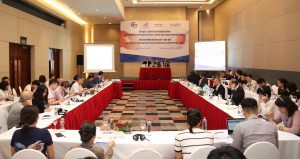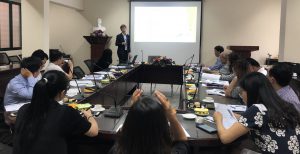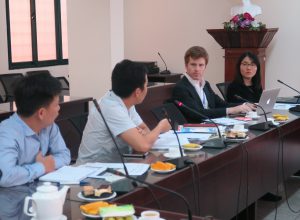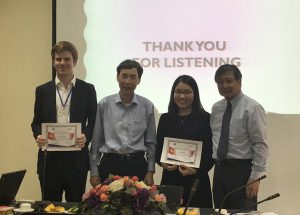The World Economic Forum on ASEAN held in Hanoi in September 2018 focused on the Age of the Fourth Industrial Revolution, where regional leaders discussed opportunities and challenges for ASEAN in an era of technological disruption. Following up on the policy debate at the Forum, the Central Institute of Economic Management (CIEM) under the Ministry of Planning and Investment (MPI) hosted an in-house workshop on November 15, 2018 to discuss possible courses of action for Vietnam and Japan to create mutual benefits in an era of technological disruption. The workshop provided an opportunity for young generations to discuss the issue, following the Vietnam-Japan Policy Research Forum titled “Deepening Bilateral Cooperation after 10 Years of Vietnam-Japan Economic Partnership Agreement” co-hosted by CIEM and GraSPP. Participants to the workshop were researchers from CIEM and Mr. Liam Thomas, a second-year master’s student from GraSPP.
<Hanoi Report by Liam Thomas>
With the support of the GraSPP International Conferences Participation Grant, I had the opportunity to travel to Hanoi from November 14 to 16. During this trip I took part in the 2018 Vietnam-Japan Policy Research Forum and presented in a workshop at the Central Institute of Economic Management (CIEM) under the Ministry of Planning and Investment (MPI).
The topic of the research forum was on “Deepening Bilateral Cooperation after 10 Years of Vietnam-Japan Economic Partnership Agreement” facilitated by researchers and staff members in organizations associated with economics, finance and investment between the two countries. What primarily took my attention at the event was the thorough emphasis on connecting the links between international relations, economics and finance. Many of the particular features discussed were specific aspects of trade and investment that I had previously not considered to be heavily relevant components of a bilateral relationship.
For instance, some of the Vietnamese attendants in the conference showed concern about the lack of skills transfer offered by most countries with their investment, and how this perpetuates a core weakness of Vietnamese workers who are unable to operate high skilled technology. They explained how Japan had rather facilitated the transfer of skills such as directing a significant extent of their ODA towards capacity training. They also mentioned their appreciation of other factors in the relationship such as the relatively higher productivity and wages of Vietnamese workers in Japanese companies than what could be seen from other countries.
Overall, I felt as if the emphasis on features such as these provided me with a more comprehensive understanding of the different variables that can be used to evaluate the economics and investment dimensions of a bilateral relationship.
The workshop titled “Opportunities and Challenges for Vietnam in the Fourth Industrial Revolution—How Could Vietnam and Japan Create Mutual Benefit?” at the CIEM was additionally centered around the Vietnam-Japan relations, but approaching from a future perspective than from current trends. The theme considered how these countries can deal with the imminence of the 4th Industrial Revolution, with both CIEM researcher Ahn Le and me sharing our presentations on the topic. Ahn’s presentation explained how these countries can take advantage of developments in FinTech, while my own presentation concentrated on how capacity building and IT have now become prominent components of foreign policy and how these countries have a great capability to use these areas to substantiate their relationship.
Following our presentations, the CIEM researchers attending the conference gave us commentary and questions about our materials, which I found to greatly substantiate my topic from a Vietnam standpoint. For instance, one of the points in my presentation suggested the capability for Japan to assist Vietnam in easing legislation restricting the free flow of information. This was then addressed by the CIEM members who elaborated on the current status of the legislation and the stage at which Japanese officials were already discussing this in negotiations. The commentary from Dr. Vo Tri Thanh, the former Vice President and CIEM’s Senior Expert was particularly insightful as he had substantive knowledge about the details of every subject discussed on both of the presentations in the workshop.
Overall, I found that the experience of presenting my findings and perspectives on an issue to experts within the specific area to be considerably beneficial for my own development. As someone interested in working at an NGO or think tank environment, to present at such an organization has been an irreplaceable opportunity for me to comprehend the skills and knowledge required to carry out my role in my future career effectively. Many thanks to GraSPP and CIEM for providing me this experience and to broaden my understanding of the prevailing public policy dynamics in the Asia-Pacific region.





